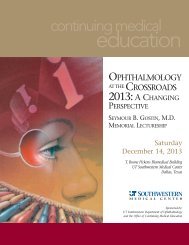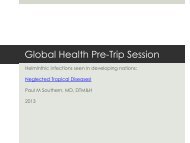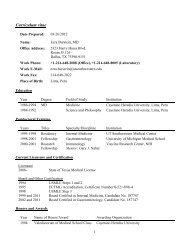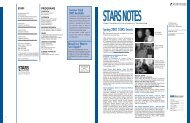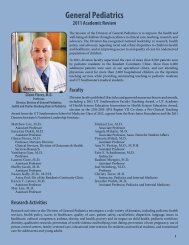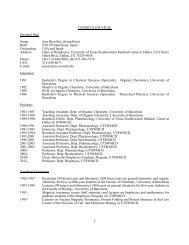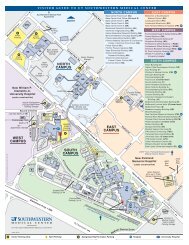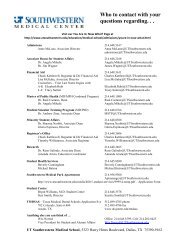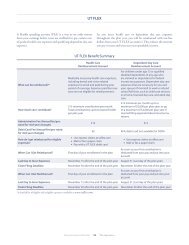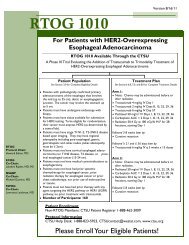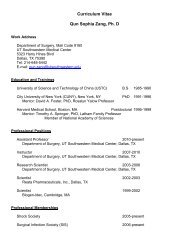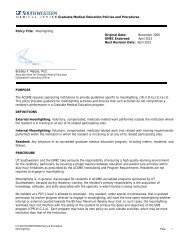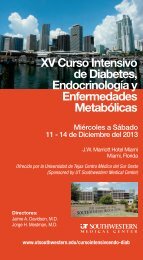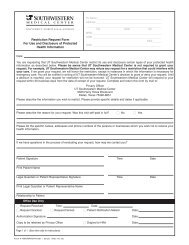Medical Student, Resident & Fellow Education - UT Southwestern
Medical Student, Resident & Fellow Education - UT Southwestern
Medical Student, Resident & Fellow Education - UT Southwestern
Create successful ePaper yourself
Turn your PDF publications into a flip-book with our unique Google optimized e-Paper software.
<strong>Medical</strong> <strong>Student</strong>, <strong>Resident</strong> & <strong>Fellow</strong> <strong>Education</strong><br />
2011 Academic Review<br />
One of the three major missions of the Department of Pediatrics is the education of medical students, residents, postdoctoral<br />
fellows and other health care professionals by transmitting knowledge, instilling excitement for learning, and translating<br />
and refining questions raised during the process. Each division has specific educational goals for the students and residents,<br />
and most divisions have fellowship programs which provide education to prepare fellows for an academic career.<br />
Soumya Adhikari, M.D., is Assistant Professor of Pediatrics at <strong>UT</strong> <strong>Southwestern</strong><br />
<strong>Medical</strong> Center and Director of the Pediatric Clerkship. He completed his residency at <strong>UT</strong><br />
<strong>Southwestern</strong>/Children’s <strong>Medical</strong> Center in 2004 and then pursued subspecialty training in<br />
pediatric endocrinology through a fellowship at <strong>UT</strong> <strong>Southwestern</strong>. Since the completion of<br />
his training, Dr. Adhikari has split his time between his clinical responsibilities, providing<br />
care for children of all ages with hormonal disorders; his research interests, primarily focused<br />
on beta cell preservation in type 1 diabetes; and his role as Clerkship Director. Dr. Adhikari<br />
earned his Bachelor of Science degree at the University of Florida in Gainesville in 1996 and<br />
received his medical degree from the University of Miami School of Medicine in 2001.<br />
Soumya Adhikari, M.D.<br />
Assistant Professor<br />
Director, Pediatric Clerkship<br />
Jeffrey McKinney, M.D., Ph.D.<br />
Associate Professor<br />
Director, Pediatric <strong>Resident</strong> <strong>Education</strong><br />
Jeffrey McKinney, M.D., Ph.D., is Associate Professor of Pediatrics and the Residency<br />
Program Director. He has a B.S.E. in Biomedical Engineering from the University of Iowa<br />
College of Engineering. He also received a degree in Physiology at Oxford University as a<br />
Rhodes Scholar, followed by M.D. and Ph.D. degrees from the University of Iowa College of<br />
Medicine. To seek additional patient and geographic diversity, he was a house officer at Yale<br />
New Haven Children’s Hospital, where he stayed as an infectious disease fellow and junior<br />
faculty member at Yale. Between 1998 and 2003 he received all three of Yale’s top service or<br />
teaching awards for Pediatric <strong>Resident</strong>, <strong>Fellow</strong> and Attending of the Year. He was recruited to<br />
the Infectious Diseases faculty at Washington University in St. Louis in 2003, where he was<br />
elected Pediatric Teacher of the Year by residents in 2008 and medical students in 2009. Dr.<br />
McKinney has been with <strong>UT</strong> <strong>Southwestern</strong> <strong>Medical</strong> Center since 2009 in his role of Program<br />
Director. He holds the Harry W. Bass, Jr. Professorship in <strong>Education</strong>.<br />
Charles R. Rosenfeld, M.D.<br />
Professor<br />
Director, Pediatric <strong>Fellow</strong>ship <strong>Education</strong><br />
Charles R. Rosenfeld, M.D., Professor of Pediatrics, Obstetrics/Gynecology, and<br />
Anesthesiology in the Division of Neonatal-Perinatal Medicine at <strong>UT</strong> <strong>Southwestern</strong>, serves<br />
as the Director of <strong>Fellow</strong>ship <strong>Education</strong> and holds the George L. MacGregor Professorship<br />
in Pediatrics. His research is focused on mechanisms modulating uteroplacental and<br />
umbilical blood flows, development of the renin-angiotensin system, cardiovascular role of<br />
estrogens in pregnancy and fetal-neonatal blood pressure regulation. Dr. Rosenfeld obtained<br />
his medical degree from Emory University, Atlanta, Georgia, in 1966. Post-doctoral training<br />
included Pediatric Residencies at Yale-New Haven <strong>Medical</strong> Center, New Haven, Connecticut,<br />
1966 - 1967, and Bronx Municipal Hospital Center and Albert Einstein College of Medicine,<br />
New York, New York, 1967 - 1970, a Pediatric Pulmonary Medicine <strong>Fellow</strong>ship at Albert<br />
Einstein College of Medicine, 1970 - 1971 and a Research <strong>Fellow</strong>ship in Neonatal-Perinatal<br />
Medicine at the University of Colorado <strong>Medical</strong> Center, Denver, 1971 - 1973. He joined the<br />
<strong>UT</strong> <strong>Southwestern</strong> faculty in July 1973. Dr. Rosenfeld has had continuous NIH funding for<br />
more than 30 years and has published more than 170 peer-reviewed manuscripts.<br />
1
<strong>Medical</strong> <strong>Student</strong> <strong>Education</strong><br />
As one of four medical schools in the University of Texas system, <strong>UT</strong> <strong>Southwestern</strong> accepts approximately 230-240 students<br />
annually. The education of these students remains one of the core missions of the Department of Pediatrics. A solid foundation<br />
in childhood health and illness has long been recognized as one of the central components of a well-rounded medical<br />
education, and the Department of Pediatrics strives to offer students the opportunity to explore the full breadth of pediatric<br />
medical care through their many programs.<br />
At the center of these offerings is the core clerkship in Pediatrics for third-year medical students at <strong>UT</strong> <strong>Southwestern</strong>. This<br />
required element of the medical curriculum consists of an eight-week rotation through the many care units housed at<br />
Children’s <strong>Medical</strong> Center, in addition to select locations at Parkland Health & Hospital System and, uniquely, through the<br />
offices of select community pediatricians from around the North Texas area who volunteer to participate in student education<br />
by hosting medical students in their offices. During this eight-week rotation, students spend four weeks on the inpatient<br />
service units at Children’s and another four weeks in various ambulatory settings. The inpatient experience is aligned to<br />
maximize student participation in all aspects of patient care: students spend two weeks of their time on an inpatient medicine<br />
ward and two weeks on one of the hospital’s subspecialty wards. The outpatient experience provides trainees a one-week<br />
exposure to neonatal care at the newborn nursery in Parkland, two weeks of ambulatory experience focused in the <strong>Medical</strong><br />
<strong>Student</strong> Clinic, and the aforementioned opportunity to spend a week at the office of a private general pediatrician in the<br />
Dallas community. This latter week provides students a unique perspective into the provision of care outside of a traditional<br />
academic teaching environment.<br />
In the <strong>Medical</strong> <strong>Student</strong> Clinic (MSC), third-year students work directly with attending physicians from the faculty of the<br />
Department and with local pediatricians who volunteer their time. Knowing that patients who present to MSC will only be<br />
seen by them and their attending physician provides students a higher level of responsibility than in many other aspects of<br />
their 3 rd year of training. During these two weeks, students also rotate through many of the subspecialty care clinics located<br />
throughout the hospital to gain exposure to the full breadth of specialized care provided by staff physicians.<br />
A full curriculum based on the core competencies as published by the Council on <strong>Medical</strong> <strong>Student</strong> <strong>Education</strong> in Pediatrics<br />
(COMSEP) is taught through bedside clinical supervision and daily rounds, in addition to various didactic sessions and<br />
interactive case-based discussions facilitated by faculty in nearly all divisions in the Department. <strong>Student</strong>s also participate<br />
in community advocacy through their involvement in nutrition education programs for elementary school students in the<br />
Dallas Independent School District. The entire curriculum is reviewed on an ongoing basis based on feedback from medical<br />
school faculty, national regulatory agencies and students themselves. The entire experience is facilitated through one central<br />
website which hosts all of the pertinent educational resources for the students rotating through Pediatrics. <strong>Student</strong>s rotating<br />
through the core clerkship continue to outpace national averages on standardized assessments. For the 2010-2011 academic<br />
year, <strong>UT</strong> <strong>Southwestern</strong> students scored four points above the national average for comparable pediatric clerkships on the<br />
National Board of <strong>Medical</strong> Examiners subject exam in Pediatrics. The overall performance of the students on the NBME<br />
exam was the highest it has been in seven years.<br />
Fourth-year medical students at <strong>UT</strong> <strong>Southwestern</strong> have more flexibility to tailor their academic schedule to meet individual<br />
learning goals. Whether students want to gain a more in-depth exposure to pediatric subspecialties in preparation for an<br />
eventual career in pediatrics or just to strengthen their foundation in caring for children in advance of another career path,<br />
the department offers numerous opportunities to fourth-year students through the facilities at Children’s and Parkland.<br />
<strong>Student</strong>s can immerse themselves in acute/intensive care experiences via rotations in the Neonatal Intensive Care Unit, the<br />
Pediatric Intensive Care Unit, Cardiovascular Intensive Care Unit and Pediatric Emergency Medicine.<br />
Extended experiences in any of a number of subspecialty clinics including Pediatric Hematology-Oncology, Nephrology,<br />
Gastroenterology, Endocrinology and others are available for fourth-year students as well. In addition, a total of 40 students<br />
from outside institutions came to <strong>UT</strong> <strong>Southwestern</strong> and Children’s <strong>Medical</strong> Center in the past to do visiting rotations in<br />
pediatrics. The department also offers, and continues to strive to increase the number of, international elective opportunities<br />
for our students and is in the process of developing programs to attract top students from international medical schools to<br />
do visiting rotations in Dallas this coming year.<br />
<strong>Medical</strong> students rated their experience on their Pediatrics Clerkship in 2010-2011 as overwhelmingly positive. <strong>Student</strong><br />
feedback from course evaluations has remained consistently positive, specifically as it relates to autonomy, promotion of<br />
clinical skills, and preparation for internship. On the 2011 graduation questionnaire, 87.8% of <strong>UT</strong> <strong>Southwestern</strong> students<br />
2<br />
rated their educational experience as “good” or “excellent,” continuing a trend of excellence in that measure for the past<br />
several years.<br />
Faculty from the Department of Pediatrics also participate, often in leadership roles, in the more didactic curriculum of the<br />
first two years of medical school, including such key courses as genetics, biochemistry and medical ethics. Beginning with<br />
the 2007-2008 academic year, faculty members in the department also served as mentors in the new colleges system at <strong>UT</strong><br />
<strong>Southwestern</strong>. Each college’s mentor leads a group of six medical students in both first- and second-year classes and deliver<br />
curricula such as professionalism and ethics, communication skills like taking patients’ histories, diagnostic and physical<br />
exam skills, and clinical reasoning and interpretation skills through weekly small group meetings. The first group of students<br />
to participate in the colleges program graduated this past year.<br />
The department takes great pride in the quality of teaching provided by the entire faculty. At the 2011 Excellence in <strong>Education</strong><br />
Annual Reception and Award ceremony, three faculty members in the department received teaching awards. These included<br />
Dr. James Amatruda, recognized for excellence for his role in the MS1 Preclinical curriculum, and Drs. Karthik Srinivasan<br />
and Vineeta Mittal, who received Pediatrics Core Clerkship Teaching Awards. Perhaps most telling, 41 students from the<br />
graduating medical school class of 2011 have chosen to pursue a career in pediatrics or some combined program including<br />
pediatrics.<br />
<strong>Resident</strong> <strong>Education</strong><br />
The <strong>UT</strong> <strong>Southwestern</strong> Pediatric Residency Program at Children’s <strong>Medical</strong> Center partners with the<br />
Department of Pediatrics faculty members to provide broad and deep educational experiences to our<br />
98 <strong>UT</strong> <strong>Southwestern</strong>/Children’s <strong>Medical</strong> Center pediatric house officers, as well as more than 200<br />
visiting trainees in anesthesia, emergency medicine, family medicine and psychiatry. Each division<br />
in the Pediatrics Department contributes substantially to the Residency Program in important<br />
ways, including educating residents during each rotation and through noon conference didactic<br />
presentations.<br />
<strong>Resident</strong>s go through 13 four-week rotations throughout the academic year. The rotations offer the<br />
residents their core education in pediatric medicine as practiced in the emergency room, pediatric ward<br />
medicine teams, newborn nursery, neonatal and pediatric intensive care units and subspeciality ward<br />
service teams. Additional training in subspecialty consult services and other individualized training<br />
are offered as electives. Learning clinic-based pediatrics with continuity of care and longitudinal<br />
follow up occurs throughout training.<br />
Pediatric Residency Program Team<br />
The program is led by Jeffrey McKinney, M.D., Ph.D., Program Director. He holds the Harry W.<br />
Bass, Jr. Professorship in Pediatric <strong>Education</strong>. Dr. McKinney works closely and collaboratively with<br />
the program’s two Associate Program Directors, Dorothy Sendelbach, M.D. and Lauren Gore, M.D.,<br />
and the Program Coordinator, Dawn Bayé, M.B.A. They offer unique and complimentary talents and<br />
insights that strengthen the program and the education of its residents.<br />
Dr. Natalie Pounds<br />
Dr. Jackie Powers<br />
Dr. David Sutcliffe<br />
Dr. Jeffrey McKinney<br />
Dr. Dorothy Sendelbach<br />
The 2011-2012 Chief <strong>Resident</strong>s<br />
were Natalie Pounds, Jackie Dr. Lauren Gore<br />
Powers and David Sutcliffe.<br />
Each chief is selected for academic and non-academic<br />
interests that will enhance the Residency Program.<br />
During their PL2 year, chiefs go through a selection<br />
process that allows for the Program to make a thoughtful<br />
and strategic chief selection. Chiefs are heavily involved<br />
in the day-to-day activities of the program and serve as<br />
a liaison among faculty members and residents.<br />
3
Pediatric Residency Program Features for 2011<br />
Advocacy Build-out<br />
Under the direction of Nancy Kelly, M.D., M.P.H. and Christina Bourland, M.D., the advocacy program for the residents<br />
is now among the best in the nation. The ideal resident advocacy project is one in which the resident or residents choose<br />
an issue in which they are passionately interested; identify evidence-based approaches to this issue in our community and<br />
elsewhere; and partner with local community organizations to develop sustainable measurable interventions and solutions<br />
that they implement within the community itself, and report to other advocacy leaders.<br />
The program was changed to allow for PL1 and PL2s to have increased investment in their projects and allow for prolonged<br />
time in development of their projects.<br />
• PL1s are now charged with identifying pediatric healthrelated<br />
issues of interest to them. During their PL1 year,<br />
they also decide on their mentor and rigorously explore<br />
ideas on potential projects.<br />
• PL2s are now diving into the issue they find of interest,<br />
conducting literature reviews and assessing the national<br />
and local approaches to the issue. The PL2s are now<br />
working to develop their project with a community<br />
component. Part of all projects must take place outside<br />
of the Children’s <strong>Medical</strong> Center walls. <strong>Resident</strong>s are<br />
encouraged to apply for CATCH grants as well.<br />
• PL3s are required to write an abstract summarizing the<br />
project they are submitted to CMC the resident abstract<br />
competition. PL3s also have to write a reflective essay.<br />
<strong>Resident</strong>s will go on to do formal presentations of the<br />
projects at national conferences.<br />
Nancy Kelly, M.D., M.P.H., and Christina Bourland, M.D., are recipients of the nationally competitive 2011 Transforming<br />
Pediatric Residency Training to Improve Care for Underserved Children grant, sponsored by the American Academy of<br />
Pediatrics with support from the Josiah Macy Jr. Foundation. Through this program, the Community Pediatrics Training<br />
Initiative (CPTI) supports residency programs to improve child health by transforming the way pediatricians approach their<br />
roles to better address the millennial needs of child health, particularly in underserved communities.<br />
<strong>Medical</strong> Literature and Its Critical Application<br />
During 2011 the Residency Program, with leadershipo by chief residents, David Sutcliffe and Natalie Pounds, we improved<br />
the medical literature library. The improved library system is key to getting valid, important medical literature to residents at<br />
the bedside. Our literature-driven rounds and teaching conferences foster more sophisticated clinical care.<br />
The library system has developed into a group of papers that now are searchable and contain key facts that can be reviewed.<br />
To increase the ease of searching the library, the file naming system was updated to standardize the library. <strong>Resident</strong>s add<br />
papers that are meaningful from their own literature searches. Each paper is attributed to the person who submitted it, also<br />
allowing residents to maintain their own online literature library. With the use of sticky notes, papers now are tagged with<br />
the important aspects of the paper allowing a reader to quickly find the paper they need. It provides an entry point to the<br />
content of the paper.<br />
Through the use of iPod Touches, residents can quickly and easily search the library for papers that will assist them at bedside<br />
and give them the ability to quote medical literature in their progress notes to drive the management of their patient.<br />
In addition to enhancing the resident site, a faculty access site was developed to mirror the residents’ library. The faculty site<br />
promotes faculty involvement in expansion of the library. It also allows faculty to review what medical literature the residents<br />
are using for their practices, increase teaching and patient care.<br />
4<br />
<strong>Medical</strong> Spanish<br />
Due to the increasing prevalence of patients with limited English proficiency, novel ways to improve communication between<br />
providers and patients is critical. While incorporating medical Spanish into a program, an important variable for which to<br />
account is the wide range of baseline Spanish skills. The competency spectrum requires a system for accurate identification<br />
of Spanish proficiency, as well as highly motivated individuals who will succeed when given the correct opportunities. Our<br />
Program, with the work of Lauren Gore, M.D., A.P.D., and Jackie Powers, M.D., Chief <strong>Resident</strong>, designed a two-tier approach<br />
toward medical Spanish education.<br />
For residents self-identified at a beginner level, an institution Rosetta Stone subscription was obtained, with the goal to<br />
improve conversational skills rather than obtain fluency. Interested residents were chosen at random to participate. Frequency<br />
of use, total hours utilized, assessment scores and levels obtained were monitored. A post-participation survey assessed views<br />
toward the program and improvements in Spanish level, and identified whether users were more aware of their limitations<br />
and more likely to utilize the Spanish skills they had gained from the program.<br />
An Advanced <strong>Medical</strong> Spanish elective was designed for residents with a solid background in the Spanish language. Prerequisites<br />
included a screening interview, competency test, self-study plan and review of medical Spanish literature. <strong>Resident</strong>s<br />
improved their terminology and fluency under the direction of professional interpreters at Children’s <strong>Medical</strong> Center and<br />
supervising faculty at a community clinic, and through self study. One on one interaction with interpreters provided real-time<br />
feedback, which provided insight in fluency limitations and depth of skills. This feedback allowed residents to understand<br />
when it was appropriate to use their own skills versus utilizing a professional interpreter. Trainees additionally learned how<br />
language barriers impact healthcare disparities, and, more importantly, how to effectively overcome barriers by identifying<br />
available resources in various settings.<br />
<strong>Resident</strong> Mentorships<br />
Mentor Program<br />
A continued highlight of the Residency Program is the Mentor Program. The Mentor Program allows each resident to have<br />
a faculty member from intern year to graduation who guides them professionally and personally through residency. The<br />
mentors meet as a group monthly with the Department Chair and the Program Director to review each intern or resident’s<br />
progress and career development.<br />
Mentors<br />
In 2011, 16 faculty members served as mentors:<br />
Soumya Adhikari, M.D. Paul Harker-Murray, M.D., Ph.D. Dorothy Sendelbach, M.D.<br />
Christina Bourland, M.D. Nancy Kelly, M.D., M.P.H. Maeve Sheehan, M.D.<br />
Matthew Cox, M.D. Josh Koch, M.D. Joel Steinberg, M.D.<br />
Maite de la Morena, M.D. Laura McClendon, M.D. Jennifer Walsh, M.D.<br />
Becky Ennis, M.D. Pamela Okada, M.D. Myra Wyckoff, M.D.<br />
Lauren Gore, M.D.<br />
Faculty Teaching Mentors<br />
The Residency Program has broadened the faculty involvement to teach the resident in various settings: Friday Morning<br />
Report, Senior Morning Report (small group, literature-based, morning reports that develop critical thinking skills), Morbidity<br />
and Mortality series and Clinical Decision Making series. The increased faculty involvement now has an investment from all<br />
sectors of the Department of Pediatrics, and the increased involvement has allowed the Residency Program to broaden the<br />
portfolios of those teaching residents. <strong>Resident</strong>s are able to improve on their clinical decision making because of increased<br />
interaction with our broad and deep talent pool of medical faculty.<br />
5
The Faculty Teaching Mentors are:<br />
Senior Morning Report Faculty<br />
Soumya Adhikari, M.D. Vijay Kalidindi, M.D. Zora Rogers, M.D.<br />
James Amatruda, M.D., Ph.D. Joshua Koch, M.D. Charles Rosenfeld, M.D.<br />
John Andersen, M.D. Ben Lee, M.D. Yadira Sanchez, M.D.<br />
Kathryn Ban, M.D. George Lister, M.D. Dorothy Sendelbach, M.D.<br />
Theresa Barton, M.D. Laura McClendon, M.D. Bharath Thankavel, M.D.<br />
George McCracken, Jr., M.D.<br />
Marita Thompson, M.D.<br />
Ralph DeBerardinis, M.D., Ph.D. Jeffrey McKinney, M.D., Ph.D. Lewis Waber, M.D., Ph.D.<br />
Leslie Garner, M.D. Vineeta Mittal, M.D. Jennifer Walsh, M.D.<br />
Lauren Gore, M.D. Emily Osier, M.D. Jonathan Wickiser, M.D.<br />
Paul Harker-Murray, M.D., Ph.D. Ashish Patel, M.D. Robert Wiebe, M.D.<br />
Mambarath Jaleel, M.D. Lynn Punaro, M.D. Myra Wyckoff, M.D.<br />
Jeffrey Kahn, M.D., Ph.D. Raymond Quigley, M.D. William Zinser, M.D.<br />
Critically Appraised Topics Mentors<br />
Kathryn Ban, M.D. Vijay Kalidindi, M.D. Christina Seeley, M.D.<br />
Matthew Cox, M.D. Ben Lee, M.D. Dorothy Sendelbach, M.D.<br />
Lauren Gore, M.D. Amit Mehta M.D. Leticia Shanley, M.D.<br />
Melissa Harlan, M.D. Lynn Punaro, M.D. Bharath Thankavel, M.D.<br />
Gregory Jackson, M.D. Erin Scheideman, M.D. Kathleen Vandiver, M.D.<br />
Morbidity & Mortality Mentors<br />
Lina Chalak, M.D. Vijay Kalidindi, M.D. Philip Shaul, M.D.<br />
Mark Clay, M.D. Jeffrey Kahn, M.D., Ph.D. Maeve Sheehan, M.D.<br />
Matthew Cox, M.D. Jeffrey McKinney, M.D., Ph.D. Myra Wyckoff, M.D.<br />
Lauren Gore, M.D. Dorothy Sendelbach, M.D. Thomas Zellers, M.D.<br />
Intern Recruitment<br />
During the recruitment season, the Pediatric Residency Program interviewed more than 300 applicants. We are looking<br />
forward to the next intern class that begins June 2012. With an increase of applicant interviewers that span the entire<br />
Department, the intern classes continue to grow in their talent and diversity.<br />
Our faculty graciously invested more than 1,000 hours in interviews alone. The core interviewers were:<br />
Kathryn Ban, M.D. Andrew Koh, M.D. Norberto Rodriguez-Baez, M.D.<br />
Bradley Barth, M.D. Karen Latour, M.D. Zora Rogers, M.D.<br />
Christina Bourland, M.D. Benjamin Lee, M.D. Pablo Sánchez, M.D.<br />
Carolyn Cannon, M.D., Ph.D. George Lister, M.D. Meghana Sathe, M.D.<br />
Mark Clay, M.D. Tanya Martinez-Fernandez, M.D. Erin Scheideman, M.D.<br />
Matthew Cox, M.D. Timothy McCavit, M.D. William Scott, M.D., M.S.<br />
Cindy Darnell, M.D., M.S.C.S. Laura McClendon, M.D. Christina Seeley, M.D.<br />
Arlene Davis, M.D. George McCracken, Jr., M.D. Dorothy Sendelbach, M.D.<br />
Becky Ennis, M.D. Jeffrey McKinney, M.D., Ph.D. Philip Shaul, M.D.<br />
Lauren Gore, M.D. Amit Mehta, M.D. Martha Stegner, M.D.<br />
Michael Green, M.D. Pamela Okada, M.D. Elizabeth (Kaili) Stehel, M.D.<br />
Paul Harker-Murray, M.D., Ph.D. Emily Osier, M.D. Bharath Thankavel, M.D.<br />
Shelby Joseph, M.D. Ashish Patel, M.D. Marita Thompson, M.D.<br />
Vijay Kalidindi, M.D. Reina Patel, D.O. Jennifer Walsh, M.D.<br />
Nancy Kelly, M.D., M.P.H. Julio Pérez Fontán, M.D. Tracey Wright, M.D.<br />
Laura Klesse, M.D., Ph.D. Marilyn Punaro, M.D. Myra Wyckoff, M.D.<br />
Joshua Koch, M.D.<br />
Catherine Robben, M.D.<br />
<strong>Resident</strong> Projects 2011-2012 Academic Year<br />
Award<br />
Paul Tannous, M.D., Ph.D<br />
• American Pediatric Society Society for Pediatric<br />
Research Award to be given at the Pediatric Academic<br />
Society Meeting in Boston for his abstract “Targeted<br />
Ablation of Dividing Neural Crest Cells During Mouse<br />
Development Induces Malformations Which Resemble<br />
Human Forms of Congenital Heart Disease.” 2012<br />
Travel Grant Awards<br />
Allyson Wyatt, M.D.<br />
• Awarded NASPGHAN Annual Meeting and<br />
Postgraduate Course travel grant<br />
• NASPGHAN Annual Meeting and Postgraduate Course<br />
Poster Presentation - A case of patent ductus venosus<br />
and subsequent liver masses<br />
• Submission of ‘A case of patent ductus venosus and<br />
subsequent liver masses’ to Journal of Pediatric and<br />
Developmental Pathology<br />
Pavel Davizon Castillo, M.D.<br />
• Awarded the 2012 American Society of Pediatric<br />
Nephrology <strong>Resident</strong> Travel Award to attend the<br />
American Society of Pediatric Nephrology/Pediatric<br />
Academic Society Meeting in Boston.<br />
Presentation<br />
Courtney Baldridge, M.D. and Rachel Jamison,, M.D.<br />
• Abstract titled “Pediatric <strong>Resident</strong>s Improving Seizure<br />
Management in Ghana Hospital” accepted for poster<br />
presentation at Advocacy Special Interest Group Session<br />
at Pediatric Academic Society Meeting in Boston 2012<br />
Publications<br />
Paul Tannous, M.D., Ph.D.<br />
• Yoon L, Tannous P, Sanghavi R, Kaul A. Idiopathic<br />
ganglioneuromatosis of the gastrointestinal tract. In<br />
review.<br />
• Berry JM, Vien L, Battiprolu P, Tannous P, Czubryt M,<br />
Backs J, Bassel-Duby R, Olson EN, Rothermel AR, Hill,<br />
JA. Reversibility of Adverse, Calcineurin-Dependent Cardiac Remodeling. Circulation Research. 2011 July 11;109:407-<br />
417.<br />
• Co-author on a Circulation manuscript, July 2011<br />
• Co-author on a case-series report, currently in review<br />
Lisa Scheid, M.D.<br />
• Case report “A 17-year-old male with nephrotic syndrome and diffuse adenopathy” published in Pediatric Nephrology<br />
in December 2011.<br />
Teresa Tseng, M.D.<br />
• Keller N, Bhatia S, Braden JN, Gildengorin G, Johnson J, Yedlin R, Tseng T, Knapp J, Glaser N, Jossan P, Teran S, Rhodes<br />
ET, Noble JA. (2012) “Distinguishing Type 2 Diabetes from Type 1 Diabetes in African American and Hispanic American<br />
Pediatric Patients.” PLoS ONE 7(3): e32773. doi:10.1371/journal.pone.0032773<br />
• Tseng, T, Iosif, AM, Seritan AL. (2011) “The Cost of <strong>Education</strong>: <strong>Medical</strong> <strong>Student</strong> Stress during Clerkships.” <strong>Medical</strong><br />
Science Educator 21(4), 360-366.<br />
• Tseng, T., Iosif, AM, Seritan, AL. (2011) “Stress Effects: A Study of Salivary Cortisol Levels in Third-year <strong>Medical</strong><br />
<strong>Student</strong>s.” Stress and Health 27: 436–440. effects: A study of salivary cortisol levels in third year medical students. Stress<br />
and Health. 2011; Jan 12<br />
6 7
Isaac Marin-Valencia, M.D.<br />
1. Choi C, Ganji SK, DeBerardinis RJ, Hatanpaa KJ, Rakheja D, Kovacs Z, Yang XL, Mashimo T, Raisanen JM, Marin-<br />
Valencia I, et al. 2-hydroxyglutarate detection by magnetic resonance spectroscopy in IDH-mutated patients with<br />
gliomas. Nat Med;18:624-9.<br />
2. Maher EA, Marin-Valencia I, Bachoo RM, et al. Metabolism of [U-(13) C]glucose in human brain tumors in vivo. NMR<br />
Biomed.<br />
3. Marin-Valencia I, Cho SK, Rakheja D, et al. Glucose metabolism via the pentose phosphate pathway, glycolysis and<br />
Krebs cycle in an orthotopic mouse model of human brain tumors. NMR Biomed.<br />
4. Marin-Valencia I, DeBerardinis RJ. Targeting the metabolic flexibility of cancer cells: straighten up and die right. Cell<br />
Cycle;10:188.<br />
5. Marin-Valencia I, Good LB, Ma Q, et al. Glut1 deficiency (G1D): Epilepsy and metabolic dysfunction in a mouse model<br />
of the most common human phenotype. Neurobiol Dis.<br />
6. Marin-Valencia I, Good LB, Ma Q, Jeffrey FM, Malloy CR, Pascual JM. High-resolution detection of (1)(3)C multiplets<br />
from the conscious mouse brain by ex vivo NMR spectroscopy. J Neurosci Methods;203:50-5.<br />
7. Marin-Valencia I, Yang C, Mashimo T, et al. Analysis of tumor metabolism reveals mitochondrial glucose oxidation in<br />
genetically diverse human glioblastomas in the mouse brain in vivo. Cell Metab;15:827-37.<br />
Officer Position<br />
Ashley Lucke, M.D.<br />
• Elected by the American Academy of Pediatrics Section on <strong>Medical</strong> <strong>Student</strong>s, <strong>Resident</strong>s and <strong>Fellow</strong>ship Trainees to the<br />
position of AAP District 7 Assistant District Coordinator.<br />
<strong>Fellow</strong> <strong>Education</strong><br />
In January 2005, the department established an interdisciplinary program for subspecialty education. The objective, a work<br />
in progress, is to develop a departmental repository of educational and administrative resources and experiences to enrich<br />
the opportunities offered by the individual subspecialty training programs. The program is directed by Dr. Rosenfeld, who<br />
has more than 35 years experience in postgraduate education and research, in conjunction with the Program Directors,<br />
other faculty and, very importantly, the fellows. Central to the program’s activities is a bimonthly conference designed to<br />
explore and discuss institutional resources, examine approaches and requirements needed to initiate clinical and laboratory<br />
research, plan a career and make career choices, present ongoing research by faculty and fellows, and provide a site for social<br />
interaction and discussions between trainees from all subspecialties. The program is unique in that much of the ACGME<br />
required core curriculum can be achieved in a manner that best meets the needs of each trainee.<br />
During 2011, there were 96 subspecialty trainees within the various divisions. Tremendous value is placed on preparing these<br />
young pediatricians to undertake careers as clinician-investigators, teachers, subspecialty consultants and, more generally,<br />
as contributors to the growing body of knowledge in pediatric medicine and developmental biology. <strong>Fellow</strong>ship education<br />
is viewed as the first and most important step in the transfer of the academic mission to the next generation. The last<br />
decade has been associated with a substantial change in postgraduate education, prompted by the recognition that the “old”<br />
apprenticeship system often shortchanged the education of the trainee in the interest of providing clinical service. This has<br />
resulted in guidelines that guarantee the integrity of the educational environment against the demands that the changing<br />
healthcare landscape has been applying on academic centers. Although the spirit of these guidelines has been welcomed by the<br />
academic community, the balance between clinical responsibility and education remains an issue that is in flux.<br />
The department, therefore, sees opportunity in this changing educational environment. Key to realizing this opportunity is<br />
acknowledging that subspecialty training must accomplish three goals:<br />
1. Prepare future subspecialists cognitively and technically to practice their discipline proficiently using an evidence-based<br />
approach;<br />
2. Provide analytical skills and critical thinking necessary to confront conditions they may not have previously encountered; and<br />
3. Engender a desire to advance knowledge and improve care through research and teaching.<br />
To facilitate the pursuit of these goals, each division has a training program that provides the clinical experience and<br />
research environment for trainees to be exposed to scientific investigation and be taught the means to translate inquiry into<br />
scholarship. All subspecialty programs were reaccredited by the Residency Review Committee of the ACGME in 2008 and<br />
contain clinical and research experiences in accordance with the guidelines set forth by the American Board of Pediatrics. In<br />
compliance with these guidelines, each trainee has a Scholarship Oversight Committee that assists the Program Directors in<br />
monitoring each trainee’s research experiences.<br />
2011 - 2012 <strong>Resident</strong>s<br />
The Department of Pediatrics encourages its subspecialty fellows<br />
to participate in national and local activities that will enhance<br />
their education. <strong>UT</strong> <strong>Southwestern</strong>’s fellows have been recognized<br />
for their accomplishments and academic potential by receiving<br />
awards and grants from many sources. Several fellows also have<br />
competed successfully for fellowships from the Pediatric Scientist<br />
Training Program and K-awards from the NIH or analogous<br />
mentored research grants. The Department and <strong>Medical</strong> School<br />
are committed to encouraging and assisting talented physicians<br />
to develop an academic career; to this end, <strong>UT</strong> <strong>Southwestern</strong> has<br />
created a Physician-Scientist Training Program and a Curriculum<br />
in Patient-Oriented Research to help launch the careers of<br />
promising trainees.<br />
During 2011, there were 96 trainees within the various subspecialty<br />
programs in the Department of Pediatrics. Of these, 26 completed<br />
their training in June 2011. Twenty-one of the 26 (81%) assumed<br />
academic positions in various medical schools, and six (29%) of<br />
them remained on the faculty at <strong>UT</strong> <strong>Southwestern</strong>. Notably, three<br />
Award winners Drs. Diana Zepeda-Orozco, Amy Fowler, Nathan Sundgren<br />
with Dr. Charles Rosenfeld<br />
2nd Annual Senior <strong>Fellow</strong>s’ Research Day<br />
8 9
trainees chose to do additional training/research; the remaining trainees entered into clinical practice. Of the graduating<br />
fellows, 46% received peer-reviewed funding for their fellowship research project (e.g., the American Academy of Pediatrics)<br />
and sixteen published peer-reviewed manuscripts prior to completing their training. This group also presented 46 abstracts<br />
at regional, national or international meetings during their senior year.<br />
Separate conferences have been established to meet the special needs of the 1st year fellows and the 2nd-3rd year fellows<br />
during August and September of each year. Our second year trainees presented their research in the second half of the Core<br />
Curriculum in order to receive timely critical review from their peers and the faculty at an early stage in their research efforts.<br />
A notable change in our Training Program was the establishment of a Senior <strong>Fellow</strong>s’ Research Day in 2010. During the 2 nd<br />
Annual Senior <strong>Fellow</strong>s’ Research Day in May 2011, there were 21 poster presentations and five oral presentations, the latter<br />
chosen after abstract reviews by the Faculty. This was followed by a dinner for all Trainees, Mentors, Program Directors and<br />
Division Directors and a presentation by Dr. Alfred G. Gilman, MD, PhD, a recipient of the Nobel Prize in Medicine and<br />
Chief Scientific Officer of the Cancer Prevention and Research Institute of Texas (CPRIT). The 2011 Senior <strong>Fellow</strong>s’ Research<br />
Day awards were given for best oral and poster presentations. Award winners were Dr. Nathan C. Sundgren (Oral); Drs. Amy<br />
Fowler (Poster) and Diana Zepeda-Orozco (Poster).<br />
The future of pediatric subspecialty training continues to change at <strong>UT</strong> <strong>Southwestern</strong>. We look forward to continued<br />
growth and success with our <strong>Fellow</strong>ship Programs well into the 21st century within the Department of Pediatrics at the <strong>UT</strong><br />
<strong>Southwestern</strong> <strong>Medical</strong> School.<br />
Pictured left to right<br />
2011 Graduating <strong>Fellow</strong>s<br />
Front: Drs. Jason Imundo, Edaire Cheng, Katie Stewart, Diana Zepeda-Orozco, Amy Fowler, Alejandro de la Torre, Maria Afanador,<br />
Vishal Kapadia<br />
Center: Drs. Natalie Frost, Alejandro Jordan-Villegas, Janet Hume,Amal Aqul, Atim Uya, Adrian Dyer, Susan Hsieh, Carrye Cost<br />
Back: Nathan Sundgren, Dennis Tanner, Adriana Rodriguez, John Sparks, Patrick Hairston, Kyle Lieppman, Tara DuPont, Nicholas<br />
Fustino<br />
Not Pictured: Drs. Amanda Evans and Anne Mahan<br />
10



